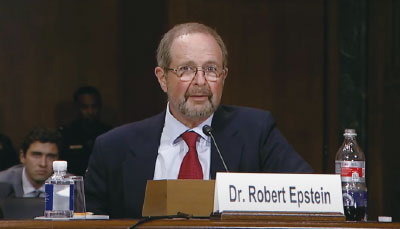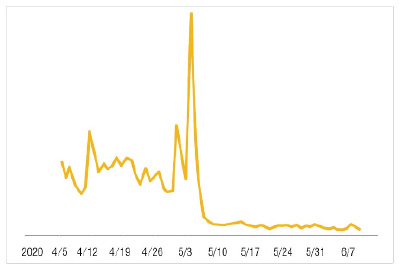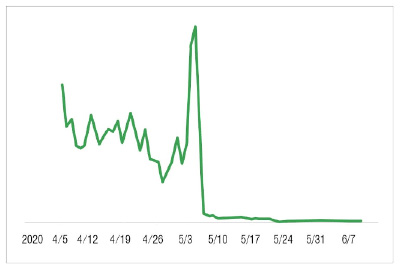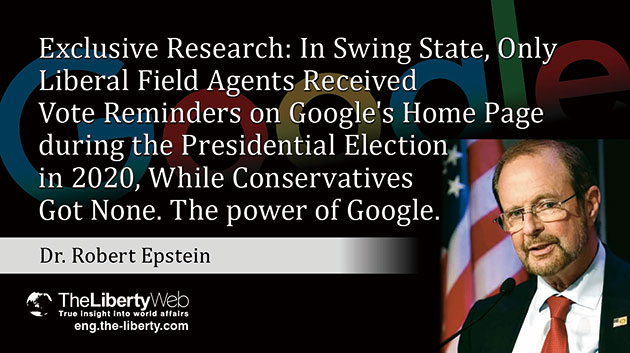Exclusive Research: In Swing States, Only Liberal Field Agents Received Vote Reminders on Google’s Home Page during the Presidential Election in 2020, While Conservatives Got None. The power of Google.
Google Restricts Freedom of Speech, Violates Antitrust Laws【Part3】
The Liberty Magazine spoke with the Senior Research Psychologist at the American Institute for Behavioral Research and Technology, who revealed how Google manipulates user’s thoughts for the first time and discovered a stunning research result.
The Algorithm for Voting Preferences

Dr. Robert Epstein:
He received his Ph.D. in psychology in 1981 from Harvard University, had a long career as a university professor, and also served as Editor-in-Chief of Psychology Today magazine. He has published fifteen books and more than 300 scientific and mainstream articles and essays. Dr. Epstein is currently Senior Research Psychologist at the American Institute for Behavioral Research and Technology.
――According to your research, Google’s search algorithm can easily shift the voting preferences of undecided voters. And you point out that biased search results have one of the largest behavioral effects. Could you again explain this point in greater detail?
Dr. Epstein: I first discovered back in 2013 that when there is a bias in search results, that has a big effect on the opinions and the voting preferences of undecided voters.
If you are an undecided voter and you click on a high-ranking search result – the first search result, for example, which is normally what people click on – and if that takes you to a web page that makes one political candidate look better than another political candidate, you will tend to believe what is in that high search position. In fact, we can easily shift 20% or more of undecided voters in one direction – up to 80% in some demographic groups – after just one search. Those numbers, to me, are disturbing and surprising.
Over the years, we’ve done many experiments on this effect, which we call the Search Engine Manipulation Effect. We abbreviate this as SEME, which we pronounce “seem”. We discovered SEME in 2013, and since then we have replicated the experiments with tens of thousands of people in five national elections. There is no question that this effect is real.
That was just the beginning, though, because, since then, we have learned more about SEME, and we have also discovered about a dozen other new forms of online influence that are extremely powerful – that are affecting the opinions, attitudes, beliefs, purchases, and votes of people around the world. And these techniques are mainly in the hands of just two American companies – Google and Facebook. So this is very dangerous.
Influence without Knowledge or Consent
Dr. Epstein: We also discovered that these techniques can change people’s opinions and votes with them having no idea that they’re being influenced. This is the most dangerous type of influence there is – when people are being influenced but they don’t know they’re being influenced. In that situation, people believe that they have made up their own minds – that they have made their own decision and that there were no outside forces affecting them. There is another aspect of this which is very disturbing. Most of these techniques use what are called “ephemeral experiences” – experience that are fleeting and that leave no trace. In a leak of emails from Google to the Wall Street Journal in 2018, one Google employee says to others, “How can we use ephemeral experiences to change people’s views about Trump’s travel ban?” This tells us that Google understands the power that ephemeral experiences have and deliberately uses such experiences to influence people.
Ephemeral Experiences
Dr. Epstein: So what are they? These are the fleeting experiences you have when you look at search results, search suggestions, short messages, and newsfeeds. Content like this is not stored anywhere. Authorities can’t go back in time and find these manipulations. And ephemeral content is often personalized – generated just for you. Search results, for example, affect you and then disappear. They’re gone forever. You can’t go back in time and see what search results people were shown. The same is true of autocomplete search suggestions, which we have also studied. How about sequences of videos on YouTube? The videos themselves are not ephemeral, but the sequences – those are ephemeral. We have been learning about these new techniques of influence, and we have been studying them carefully in controlled experiments. We have been doing this now for almost eight years.
Ephemeral vs Subliminal Experiences
――Are those ephemeral experiences the same as subliminal effects?
Dr. Epstein: Originally, the word “subliminal” meant something different. But, yes, I think we can reasonably call these new manipulations subliminal in the sense that we’re not noticing that a manipulation is occurring.
Affecting Enormous Voter Shifts
――So basically, people are being influenced without noticing.
Dr. Epstein: That’s correct. And it’s a serious problem. When we first started doing experiments on SEME, we were showing people search results that were blatantly biased toward one candidate or another. We wondered whether we could mask the bias in some way.
For example, we would show search results that favored one candidate – let’s say, Trump. Then we would mix in one pro-Biden search result. When we started to use masks like this, we found we could still produce large shifts in opinions and voting preferences, but fewer people were aware of the bias. When we used a position-three mask – which means Trump, Trump, Biden, Trump, Trump, Trump – 100% of the participants in that experiment did not see any bias. So we learned that it’s very simple to mask bias so people can’t see it – in other words, to hide what you’re doing so no one has any idea that there’s any kind of bias in the content they’re looking at online. The ability to hide these new forms of influence makes them extremely dangerous.
Effect of Big Tech
――According to your research, in 2016 Google’s biased search results shifted between 2.6 and 10.4 million votes to Hillary Clinton. And you stated in a Senate Judiciary subcommittee in 2019, that if all Big Tech companies support the same candidate in this presidential election, they would be able to shift upwards of 15 million votes to that candidate with no one knowing and without leaving a paper trail. This is an astounding fact. 15 million votes can change the result. And now we are witnessing the 2020 presidential election. In this election, how and to what extent did Big Tech companies affect the results?

July 2019, Mr. Epstein testifies at a hearing for the Senate Committee on the Judiciary. The image is from Senator Ted Cruz’s YouTube channel.
Dr. Epstein: Before I answer that question, let me make it clear that there are two kinds of ways that I investigate these matters. The first way is through randomized, controlled experiments. So that is experimental research – very traditional, experimental research, in which we adhere to the very highest standards of research. And we’re continuing that type of research. That’s one way we investigate. The other way we’ve been investigating online influence since 2016 is by setting up monitoring systems. Monitoring systems are not experimental research projects. They’re more practical. When we set up a monitoring system, we recruit people we call “field agents”. We protect their identities to make sure they are anonymous. And then, with their permission, we install special software on their computers that allows us to look over their shoulders to see what content they are being shown by the tech companies.
It is one thing to say, based on the experimental research, that these companies have the power to shift opinions and votes. But how do you know they are actually using that power? How do you know that there is bias or targeted messaging or some other sort of manipulation in online content? How do you know that users are actually receiving that kind of information? We learn such things through our monitoring projects, which preserve ephemeral experiences that are normally lost forever. In 2016, we had 95 field agents in 24 states, and, through their computers, we preserved more than 13,000 searches on three search engines – Google, Bing, and Yahoo – along with nearly 100,000 web pages.
Monitoring the Searches
Dr. Epstein: Normally, all of that information is lost, but we preserved it, so we could then analyze it. We looked at the election-related search results our field agents were shown, search position by search position, to see if there was bias. And we found significant pro-liberal bias – in other words, pro-Hillary Clinton bias – in all ten search positions on the first page of Google search results. (I was a Hillary Clinton supporter, by the way.) We found that bias on Google, but not on Bing or Yahoo. That comparison is important. It suggests that Google’s search algorithm was designed to favor Hillary Clinton. The level of bias we found was so high that we knew from the experimental research we had conducted that it was sufficient to have shifted somewhere between 2.6 and 10.4 million votes to Hillary Clinton with no one knowing that this was occurring and, except for our monitoring system, without leaving a paper trail.
In 2018, we set up a more ambitious, somewhat larger monitoring system to capture ephemeral content from the US midterm elections. In 2020, we set up a much larger system to monitor the presidential election: We recruited 733 field agents in three key “swing” states – states in which the Biden/Trump race was extremely close: Arizona, Florida, and North Carolina. Within those states, we also recruited field agents mainly in the battleground counties. Why were we aiming for battleground states and battleground counties? Because we were trying to go to where the manipulations would be most likely to occur. Close to an election, that is where the election campaigns put all the money, all the television and radio commercials, and all the advertising, because those swing states determine who will win the election. All three of these states tipped toward Biden, the Democratic candidate. Almost all the swing states did in 2020, which gave Biden the win.
So we were correct in going into these battleground states and the battleground counties. Our field agents were all registered voters – Democrats, Republicans, and Independents – a politically diverse group of people. We wanted to know whether they were receiving biased content from Google and other companies.
Remember that in 2016 we had only 95 field agents. This time we had 733. In 2016, we preserved 13,000 ephemeral experiences. This year we preserved over 500,000 ephemeral experiences, along with millions of web pages. And in 2016 we were only preserving search results on Google, Bing, and Yahoo. This year, we also preserved vote reminders on Google’s home page and also on Facebook’s home page. We also captured video sequences on YouTube, and other things as well. So, what we did this year was on a much larger scale and was much more ambitious than our previous monitoring projects.
Analyzing the Data
Dr. Epstein: We’ve only begun analyzing the data that we have because, as I said, we have preserved millions of web pages. But we have already found significant and disturbing evidence of voter manipulations by Google.
One way we measured bias was by using a database from the Harvard University Berkman Klein Center for Internet and Society, which has rated the political bias of more than 900 news sources. Based on the news sources Google was showing people, we found that a strong pro-liberal bias in all 10 search positions on the first page of Google search results. There was no such bias for Bing or Yahoo. Again, that comparison is important. We have also found liberal bias on Google in every demographic group we have looked at so far. In other words, we have found strong liberal bias going to liberals, moderates, and conservatives.
In one report we generated, conservatives were receiving liberal bias that was stronger than the liberal bias that liberals were seeing. So this is a consistent form of bias going out, perhaps, to millions of people in those states. We haven’t done the calculations yet (as of November 6th), but if that level of bias had been present for months before the election, and if it had been present nationwide, it would have shifted millions of votes in one direction only.
The Smoking Gun
Dr. Epstein: We also found what appears to be a smoking gun.
From October 26th to 29th, Monday through Thursday, when we looked at the vote reminders on Google’s homepage, we found that those reminders went to liberals only – that our conservative field agents did not receive vote reminders on Google’s homepage. When you have 100% versus 0%, you don’t need to do any statistical analyses to see the effect. That’s one sign of the smoking gun. But there is another sign, as well.
Making the Findings Public
Dr. Epstein: On October 29th, 2020, I decided to make our findings public. And I began to speak with a reporter from The New York Post and I sent her material summarizing our results.
I did this knowing full well that all New York Post emails are shared with Google. And the same is true of The New York Times, The Guardian, and many other major news organizations. They share their incoming and outgoing emails with Google, including the email attachments.
I knew without any doubt that all the information I was providing to this reporter would be shared with Google. This was deliberate. I wanted this information to be shared with Google.
On the night of October 29th, two things happened. Number one, the article that was supposed to appear on the morning of October 30th got pulled. In other words, it was canceled.
The second thing that happened was that Google’s home-page vote manipulation stopped completely. Starting at about three minutes before midnight that night, 100% of our field agents began receiving the vote reminder on Google’s home page, and that continued to be the case until the end of Election Day, which was November 3rd. Google turned off the manipulation.
Even though the article didn’t appear, I told other people what we had found. And as a result, on November 5th, 2020, three United States senators, Senators Mike Lee, Ron Johnson, and Ted Cruz (who was a presidential candidate in 2016), sent a letter to the CEO of Google, Sundar Pichai, summarizing my research findings and asking Mr. Pichai to explain how we could have gotten such results. This was because Mr. Pichai had recent said under oath before Congress, “We never favor any particular party or candidate.” So these senators sent a letter to Mr. Pichai suggesting that he had lied to Congress, which is a felony under US law.
They are planning to subpoena Mr. Pichai to appear again before Congress. I too will be there, and I will be asked about my research findings. And the CEO of Google will be asked to explain what we found.
Pressure from Google?
――Do you think Google put pressure on the New York Post to cancel that article?
Dr. Epstein: We might never know for sure why The Post article was canceled, but I did find a statistic that might explain what happened. 32% of The New York Post’s online traffic comes from Google. So someone from Google or someone associated with Google might have called someone at The Post and reminded him or her about where The Post’s traffic comes from. Google has the power to put The New York Post out of business, and they have used that power against other companies. In 2017, the European Commission fined Google 2.4 billion euros for suppressing traffic to its competitors.
The Antitrust Folly
――This October, the Department of Justice filed an antitrust lawsuit against Google. It is about antitrust law, but would you think the DOJ will focus on censorship and Section 230 as well?
Dr. Epstein: I know that these legal actions have started against Google, but I don’t think they are adequate. They won’t solve the problems that we have found. In fact, I’m quite puzzled about some of these legal actions because they seemed to change their direction over time. Initially, US authorities were looking at consumer protection issues. That would cover things like surveillance, manipulation, and censorship. There are all kinds of possibilities when you’re looking at consumer protection.
US antitrust law is very different. It’s more concerned with how monopolies suppress competition or fix prices. I saw investigations turn away from consumer protection issues and toward antitrust issues. I found that shift to be puzzling and a bit disturbing, because antitrust actions will not eliminate the three big threats that the Big Tech companies pose to humanity: the surveillance, censorship, and manipulation.
Breaking up Monopolies
Dr. Epstein: The way you usually deal with antitrust issues is by breaking up a company. This is what happened in the United States with Standard Oil in the early 1900s. In the US in the 1980s, this is what happened with AT&T, the big telecommunications company. We broke up those companies.
Maybe we can get Google to sell off YouTube. Maybe we can get Facebook to sell off Instagram. But that doesn’t solve any of the big problems. Selling off some companies will make the major shareholders much richer than they already are, but you cannot break up the search engine itself. So the Google search engine will still dominate search. Google will still be a monopoly. And the Google search engine is where most of Google’s power comes from – to monitor and track people, to censor content, and of course, to influence opinions and attitudes and beliefs and purchases and votes. Similarly, you cannot break up Facebook’s social media platform. Doing so would split up millions of families.
So I’m skeptical about what’s occurring with these investigations, because I think they represent what some experts call “regulatory capture.” It’s an old practice in which the government is going after a corporation, and the corporation cooperates with the government and helps it to design new laws regulations that benefit or at least minimize the damage to the corporation. To me, the present situation looks like regulatory capture. It looks like Google and perhaps Facebook are working with government officials to create laws and regulations that benefit these companies.
The GDPR Law
Dr. Epstein: In the European Union just a few years ago, a major new law was put into effect called the GDPR – the General Data Protection Regulation. The GDPR supposedly protects the privacy of citizens of the European Union, the EU. But this law has not restored privacy in Europe, and it has helped Google and Facebook. It has helped them because the law is so complicated that small companies and startups can’t comply with it. In the EU, it is now harder for startup companies to launch and harder for small companies to survive. Meanwhile, no one’s privacy has been protected by this law.
Section 230
――So do you think the DOJ should focus on Section 230?
Dr. Epstein: No, I don’t think so, because if you cut back on some of the protection that Section 230 provides the tech companies, or if you eliminate these Section 230 protections, people will start to file lawsuits over any online content they find offensive or harmful. If you are Google or Facebook, you will protect yourself from lawsuits by removing content – a practice that some people call “censorship.” Eliminating CDA 230 protections will give the tech companies a good excuse for removing almost any content at all, both proactively and reactively.
So removing this Section 230 protection will create a new kind of problem on the Internet, which right now is a relatively minor problem. The tech companies might allow only a small amount of content to appear – probably content that benefits the companies in some way. So the CDA 230 actions are, in my opinion, misguided.
The Problems with the Courts: The First Amendment Conundrum
Dr. Epstein: There is another problem, and that is sometimes when people do have sued Google, the courts in the United States have ruled that Google can show people anything at all, because the company itself has free speech rights under the First Amendment to the US Constitution. The courts have said that if Google wants to remove content from its search results or wants to demote a business, it has every right to do so.
Public Commons
Dr. Epstein: The day before I testified before Congress in 2019, I published an article in a magazine called Bloomberg Businessweek about how to end Google’s worldwide monopoly on search using a very simple method.
Our government simply has to declare that Google’s search index, which is the database they use to generate search results, is now a public commons. In the United States and the UK, the public commons is a very old idea in law. A commons could be an area of land where everyone in the town can allow their animals to graze, for example. That area of land is owned by everyone.
If Google’s index is made a public commons, any individual or business will be able to access data from the database and create its own search platform. Over time, thousands of new search platforms will appear, each catering to the needs of different groups: women, the Japanese people, conservatives, and so on. A large group of competing search platforms will exist that looks very much like the many news organizations we have today. News sources package the news in different ways to please and target different audiences, and that’s what will happen with search. Search will become competitive again, just as it was when Google was founded in 1998.
No Innovations in Search
Dr. Epstein: Google was not the first search engine; it was the 21st. Search was competitive until around 2005 when Google began to dominate search. Under my commons plan, search will also become innovative again. There has been no innovation in search for almost 20 years. But if there are thousands of search platforms, each competing for our attention, there will be innovation in search occurring every day. With Google in charge, there is no innovation at all. The commons plan is a simple solution to the Google problem because it will quickly end Google’s worldwide monopoly in search.
Google could still make money, because it could charge the larger users of the search index for accessing the data. Since Google has an extremely large search index, and since the company is constantly crawling the Internet and enlarging the index, it could still be a successful business, but it would lose its monopoly power.
――Is that what happened to AT&T?
Dr. Epstein: The US Department of Justice (DOJ) eventually broke up AT&T, but long before that, in 1952, the DOJ forced AT&T to share all its patents – thousands of them – with other companies free of charge. This was a public commons action. That sharing of patents led to an explosion of innovation in electronics and telecommunications technology around the world. The commons plan I have proposed will have comparable benefits.
Google Shares Data
Dr. Epstein: By the way, Google already grants some companies access to its index, so there is precedent for the plan I’m proposing in Google’s own business practices. Google shares its search index with Apple, for example. Apple Computers gets its answers for its Siri personal assistant from Google, and it pays Google about $6 billion a year for those answers. There is also precedent for the commons plan in laws going back hundreds of years. The commons plan is a real solution to the Google problem because it will greatly reduce the company’s surveillance capabilities, its censorship capabilities, and its manipulation abilities.
Also, it doesn’t have to be the United States that makes this occur. The European Union could also implement the commons plan because five of Google’s data centers are located in the European Union.
The Problem with Tech Lack of Understanding of Issues
――We assume you are working with some Senators or Congresspeople or, perhaps some members of the DOJ.
Dr. Epstein: I’ve been contacted by members of the House of Representatives and US Senate. There are very few members of Congress, though, who really understand these issues. Senator Ted Cruz is an exception, but, generally speaking, members of Congress do not understand the nature of the threats Big Tech companies pose to democracy and free speech. When the CEOs of the tech companies are invited to testify, very often the questions coming from members of Congress are silly. They just don’t understand the issues.
The 51 Attorneys General Lawsuit
Dr. Epstein: I have not been in touch with people from the Department of Justice, but I have been working with state attorneys general since 2015. The attorney general of any state can file lawsuits against tech companies. They don’t need to wait for the federal government to act. Our Department of Justice recently filed an antitrust lawsuit against Google, but there is another one that’s probably even more important. It was filed by 51 state attorneys general, which includes the attorneys general from 49 states and two American territories. Even here, though, I saw what began as a consumer protection action get transformed into an antitrust action. To me, this suggests regulatory capture by Google.
――Regarding the lawsuit which was filed by 51 state attorneys general, the Texas Attorney General is leading it. Are you working with him?
Dr. Epstein: Yes, his name is Ken Paxton, and I’ve spoken with him and members of his staff. I also gave a briefing for General Paxton and some of his fellow AGs last year. And yes, he is heading up this effort by the 51 AGs against Google.
Chinese Interference/Dragonfly
――We found that content which is inconvenient for the Chinese Government is often eliminated or lowered in the rank of the search results on both Google and YouTube. How do you see the relationship between Google or YouTube and the Chinese Communist Party?
Dr. Epstein: This matter is very disturbing. Although Google has stayed out of China since 2010, we learned last year that Google was secretly working again with the Chinese government and was planning to reenter the country. The secret project was called Dragonfly. Information about this program became known within the company, and led to a protest by Google employees. Then members of our Congress objected. The CEO of Google told Congress under oath that the company has stopped that program, but I’m not sure that’s true. China is a very big market – the biggest market in the world – so it’s understandable that Google wants to do business there.
There is evidence that Google is still working with the Chinese government on artificial intelligence projects. That’s disturbing because the Chinese government uses artificial intelligence to spy on the citizens of China and to make decisions about what its citizens can and cannot do. Any relationship between Google and China is inappropriate, in my view, and if I were working at Google, I would join my fellow employees in protesting that relationship.
Censorship: Changing Algorithms
――Regarding hundreds of queries, our website suddenly disappeared from the Google search results. Let me show you a graph (*as shown below). In this May, our impression regarding two keywords “China” and “coronavirus” suddenly became almost zero. What kind of measures would you think Google Japan took?
Dr. Epstein: This is quite common, and it is an example of what most Americans would call censorship. This is an example of Google changing an algorithm or a blacklist in a way that that suppresses content. Google used to announce major changes in its search algorithm. They no longer do. Also, a few years ago Google said that it made about 600 changes to its search algorithm each year. Recently, we learned from leaked documents that Google actually changes the algorithm about 3,000 times per year. And they’re no longer telling us about these changes, so many company executives live in constant fear that Google’s next change with demote their company in search rankings. None of us knows what the next change will do.
The number of times our articles showed up in queries that included the word “China”

The number of times our articles showed up in queries that included the word “coronavirus”

The Fear of Google
Dr. Epstein: Mathias Döpfner, the head of a big publishing company in Europe, published an open letter to the CEO of Google a few years ago. It was called, “Why We Fear Google.” He said that all companies live in constant fear of Google, because Google, at any moment in time, can demote them in search results or can remove them entirely. And as I said a little earlier, the courts in the United States have said that Google has complete freedom to demote or remove content from its search results because of the company’s right to free speech. Think how ironic that is. When the company removes content from its search engine, in expressing its own right to free speech, it is taking away the right that others have to free speech.
――Thank you so much for accepting our interview, Dr. Epstein.
Related
- Google Restricts Freedom of Speech, Violates Antitrust Laws【Part1】
- Exclusive Research: In Swing States, Only Liberal Field Agents Received Vote Reminders on Google's Home Page during the Presidential Election in 2020, While Conservatives Got None. The power of Google.
- U.S. Justice Department and 48 State Attorneys-General Begin Investigation into Google’s Antitrust Law Violation



















